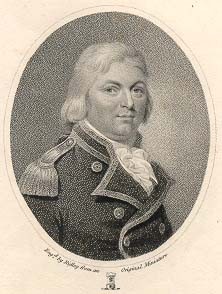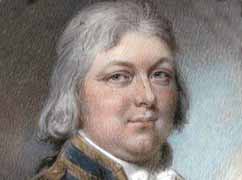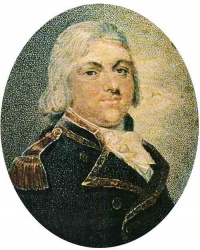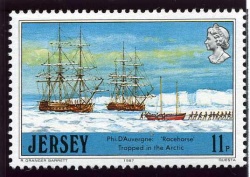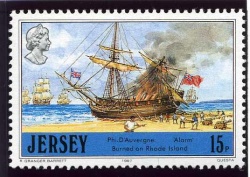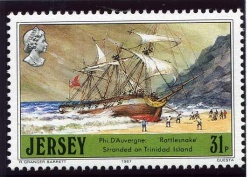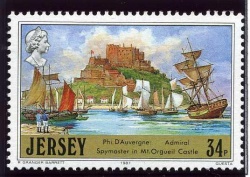Philippe d'Auvergne
|
The complete life story of Philippe d' Auvergne will probably never be told.
Even the scanty information on his private life, supplemented by the fuller records of his naval and administrative services, hardly enable one to visualize the man whose career was marked by the greatest vicissitudes.
- D'Auvergne: Back to family page and links to other articles
Capt Charles d'Auvergne
Philippe D'Auvergne was the sole surviving son of Captain Charles d'Auvergne, a member of the Jersey family of d’Auvergne which established itself in St Helier in 1696 who had served in the English Army, notably as personal aide-de-camp to the Duke of Marlborough at that farcical landing at Carcoile Bay in 1758; and Elizabeth, a daughter of Philippe Le Geyt, Lieut-Bailiff of Jersey from 1729 to 1746.
According to the St Helier Parish Register, Philippe was baptized on 13 November 1754, but it is not clear as to whether his baptism took place there or in the Old Chapel of Elizabeth Castle.
His mother survived his birth only by two weeks. Little is known of his early life and education and Philippe was not particularly happy with his step-mother. He appears to have inherited the studious characteristics of his mother's family and evidences exist showing that he was encouraged in mathematical studies by his maternal grandfather.
When the time came for him to choose a profession, his father and his uncle James endeavoured to influence him to the English Army, but young Philippe preferred the Royal Navy, which offered greater opportunities for rapid advancement.
Captain's servant
His father had some acquaintanceship with the powerful Lord Howe at the Admiralty and this, coupled with the influence of his maternal grandfather, secured for him a nomination as Captain's Servant in the Royal Yacht in 1770.
This rating did not imply any menial capacity. It was virtually apprenticeship to the professional duties of a sea officer. The alternative way of entry into the Royal Navy was through the Academy at Portsmouth, but young d'Auvergne was over the entrance age when his naval career was decided.
Service in the Royal Yacht counted as sea time and, having passed his examinations successfully, he was appointed to the Flora as a midshipman.
Whilst on a cruise in the Baltic, the Flora visited Cronstadt and a party of her officers, including d' Auvergne, were presented to the Empress Catherine II at Peterhoff by the English Ambassador Lord Cathcart.
Evidence that Midshipman d'Auvergne was offered, and declined, employment in the Imperial Russian Navy existed in the Russian Admiralty as recently as 1905. He apparently made a considerable impression on the Empress, who expressed a great desire to attach him to her personal entourage as a liaison officer to the many foreigners then serving in the Imperial Army and Navy.
Maths lessons
At Copenhagen the Flora anchored near the French Frigate La Flou, which had several important French savants aboard making scientific investigations. On this occasion young d' Auvergne was able to give full play to his scientific bent and, after the Flora was paid off, he proceeded to London to take lessons from a noted mathematician of Huguenot origin.
About this time great interest was being displayed in the possibility of a North West Passage, and the Royal Society caused the Earl of Sandwich, First Lord of the Admiralty, to petition King George III to sanction the despatch of two men-of-war to explore sea routes as far as possible to the North Pole.
Captain the Hon Constantine John Phipps, afterwards Lord Mulgrave, was appointed in command of the expedition and the sturdy bomb-vessels Racehorse and Carcass were specially equipped and manned by officers and men selected on account of their abilities and physique.
Two Sailing Masters, rated as Skippers, experienced in the Greenland Trade, were engaged as pilots and d'Auvergne was appointed to the Racehorse for special scientific and mathematical duties.
The other scientists included Israel Lyons, representing the Board of Longitude, and Mr Banks and Mr d'Alembert, representing the Royal Society. The Racehorse was commissioned by Captain Phipps on 19 April 1773 and inspected by Lord Sandwich on 22 May that year when her equipment was completed.
Spitzbergen
On 2 June she was joined by Carcass, commanded by Captain Lutwidge, and the two ships commenced their venturesome voyage. Serving in the Carcass was one Horatio Nelson, whose destiny was to become our national naval hero.
The ships reached Spitzbergen at the end of June 1773 and D'Auvergne commenced his journal recording astronomical observations and local flora and fauna.
The journal contains many interesting and faithful sketches of icebergs and other Arctic phenomena and although the expedition failed to reach a higher latitude then 80° 21' North, the official log, supplementing d'Auvergne's work, provided valuable information on the then little known and fabulous Northern Seas.
Whilst the ships were enclosed in winter ice, their officers and men exchanged visits and some critical irritation was displayed by Nelson at the serious attitude of d'Auvergne to his scientific duties.
Never were two strong personalities more divergent and the initial antagonism displayed by Nelson in those Northern Seas followed d'Auvergne through all his service career. However, d'Auvergne's recordings were undoubtedly of extreme value, for they were highly commended by Captain Phipps, whose report, published by Royal Command in 1774, contains charts and sketches mainly provided by the young Jerseyman.
American colonies
After completing his journal, d'Auvergne continued his mathematical studies in London, but these were interrupted by his appointment to the Asia, commanded by Captain van de Put, in the summer of 1774 to join the fleet, under Admiral Graves, sent to deal with the rebellious North American Colonies.
D'Auvergne was ashore with the English Troops when the Lexington engagement resulted in their defeat, and narrowly escaped capture by the victorious American Militia. He was appointed Acting-Lieutenant of the Kingfisher and subsequently transferred to the Flag ship Preston.
He was actively engaged in shore warfare at the siege of Boston and was slightly wounded during the bombardment and destruction of Falmouth. He was specially commended by Admiral Graves for bringing off a large number of wounded sailors and marines under heavy fire and was transferred to the Chatham, flagship of Admiral Shuldham, commanding the North American Station, for special duties.
He was present at the capture of New York, commanded a storming party at Fort Washington and landing forces in the New Rochelle and Kingsbridge engagements. His calm leadership before the sham barricades at White Plains inspired his men and stopped a retreat.
Admiral Sir Peter Parker, who had relieved Admiral Shuldham, attacked Rhode Island and d’Auvergne was selected by him to conduct difficult negotiations between the Admiral and General commanding the English Forces and the American Provisional Government. So well did he acquit himself that Lord Howe confirmed his rank of Lieutenant and appointed him to the command of the Alarm, specially fitted for service in river waters. Thus at the early age of 20 d’Auvergne obtained his first command.
Burnt ship
When the French fleet arrived to assist the Americans in their struggle for independence, the Alarm and two other small craft were cut off from the main English squadron by a superior French force. To avoid capture d'Auvergne ran the Alarm ashore and burnt her. He took his crew to Rhode Island and organised them as a naval brigade for service in shore batteries. To give him greater authority he was appointed Brigade-Major of a mixed force of seamen and marines.
After the French fleet had been defeated and turned south he applied for a court martial and was honourably acquitted for burning the Alarm. His personal sympathies were undoubtedly with the rebel colonists and he was extremely disappointed at the inefficiency displayed by the Army leaders. He applied for and secured permission to return to England and arrived when the nation was mourning the death of the great Pitt.
After a spell on half-pay he was appointed First Lieutenant of the 32-gun frigate Arethusa, better known as the "Saucy Arethusa", commanded by Captain Elliott. This frigate formed one of the 38 ships of war composing the Channel Squadron then being slowly driven back to the English Shores by the French Fleet of 68 battle ships.
Following an indecisive action with the French Frigate L'Aigrette in February I779, the crippled Arethusa was wrecked off Ushant and those officers and men saved from the wreck were taken prisoners by the French and confmed to fortresses in the interior.
Duke of Bouillon
D' Auvergne did not languish long in captivity. M de Sartine, Minister of the French Marine, was so astonished at the fact that a captured English Naval Officer bore the historic name of d'Auvergne that he communicated the news to the ageing Duke of Bouillon. The latter arranged for d' Auvergne to be released on parole and, after entertaining him at the Chateau of Navarre, effected his exchange for a French Naval Officer of equal rank interned in England.
At this time the old Duke was extremely exercised in his mind as to the succession to his Dukedom. His younger and favourite son had been killed, his elder and surviving son was a hopeless invalid and no child had blest his old age union with a young wife. His one senile obsession was to prevent the Dukedom passing, by default of heirs of his body, to the de Rohan ducal family.
D'Auvergne's dignified bearing in captivity and his courteous manners, when on parole, very favourably impressed the old Duke and he decided to offer adoption to the young Jerseyman and presumptive heirship to the Sovereign Duchy of Bouillon if relationship could be established between the main de la Tour d'Auvergne family in France and the d'Auvergne family in Jersey.
The old Duke was immensely wealthy - probably the richest nobleman in France - and money was no object so long as the necessary evidences were forthcoming. The Vatican records were searched by Abbe Coyer and a team of genealogical specialists and after some years of intensive work information, acceptable to the old Duke, was forthcoming that the d'Auvergnes of Jersey were descended from a cadet branch of the ancient Counts of Auvergne which had settled in Jersey in I322.
Meanwhile d' Auvergne had returned to his naval duties in command of the Lark which had been converted into a sloop-of-war. After some useful but uneventful service in the North Sea and the Baltic on convoy work he was ordered to refit for foreign service.
Surprise attack
In January I78I as Lieut-Commander of the Lark he joined a strong squadron of men-of-war, transports and East Indiamen at Spithead and sailed under Commodore George Johnstone for the Cape. At Port Praya, in the Portugese Island of St Jago, the Commodore took no adequate steps against a surprise by the French Fleet and Admiral de Suffren - France's greatest sailor - in his Flagship Heros, supported by Annibal, attacked the English squadron.
Owing to non-support by other French ships, de Suffren captured only one merchantman which was subsequently recaptured by Hero, Commodore Johnstone's flagship. Indecision on the part of Johnstone allowed the French Fleet to escape and, after some 14 days idling at Port Praya, an advance squadron led by Jason, commanded by Captain Piggott, including the Lark, captured the Dutch East-Indiaman Helwoltemada with a valuable cargo and over £40,000 in specie.
D'Auvergne, being acquainted with the Dutch language, was put in charge of the prize and secured a correct statement of all enemy shipping in Saldanha Bay from which the Dutch prize had sailed. D'Auvergne' s formal report to his Commodore enabled a successful raid to be made on the Dutch ships at Saldanha by the English squadron.
Having learnt that de Suffren had strengthened his forces at the Cape, the Commodore abandoned his campaign. He detached the Lark and three other ships to convoy the transports and Indiamen round the Cape to Madras.
After completing this task d'Auvergne was selected to carry letters to England in the Lark. As he did not wish to bear news of failure to Lord Howe, he exchanged with Commander Clements of the Rattlesnake and joined Jupiter, commanded by Captain Pasley, and Mercury, commanded by Captain Prescott, whose son later married one of D'Auvergne's illegitimate daughters, on a cruise along the east coast of South America.
Special mission
This cruise was a special mission to report on the suitability of bases for refitting ships in those waters. Commodore Johnstone was of opinion that the Isle of Trinidada, lying some 600 miles east of Rio de Janeiro, was especially suited for such purpose and d'Auvergne was ordered to make a comprehensive report.
Actually the island, which must not be confused with the large Island of Trinidad, which had first been occupied by Edmund Halley, the famous astronomer, when cruising in the Paramour Pink in 1700, was absolutely useless, but d'Auvergne, with characteristic zeal, thoroughly surveyed the island and charted all possible anchorages.
In a violent storm the Rattlesnake was driven ashore to become a total wreck. Fortunately all the ship's company were saved and most of the stores. Commodore Johnstone had meanwhile shifted his flag to the Frigate Diana and had sailed for England leaving the castaway d'Auvergne and his companions on Trinadada.
The island produced nothing but fuel and water but d’ Auvergne enforced strict discipline and made all possible arrangements for the comfort of his companions. The small community, -including one woman, was taken off by the Bristol, commanded by Captain James Burney, convoying a fleet of Indiamen on 28 December 1782.
On arrival at Madras, d’Auvergne demanded a court martial and enquiry into the loss of the Rattlesnake and his enforced stay in Trinidada. His good name and professional abilities were vindicated and Admiral Sir Edward Hughes reported so favourably that the Admiralty promoted him to Post Captain. He witnessed the protracted duels between Hughes's ships and those of de Suffren and was entrusted with the naval despatches reporting the final operations.
Captain Cook
In company with Colonel Cathcart, carrying despatches from General Stewart to the East India Company, he sailed for England. At the Cape he met the great navigator, Captain Cook, and declined an invitation to accompany him to the Southern Seas.
His rank of Post Captain was confirmed in January 1784, when he reported to the Admiralty. He was then 29 years old and in such indifferent health, due to privations in Trinidada, that he was granted long leave to recuperate. With this promotion d'Auvergne's continuous naval service afloat practically ends and his progress to legal succession to, probably, the oldest Sovereign Duchy in Europe commences.
In London our Jerseyman found the old Duke awaiting him anxiously, to complete the many formalities which would ratify his adoption as son and confirm him eventual heir to the Duchy of Bouillon.
From the autumn of 1784 d'Auvergne travelled extensively in Europe and, despite his bad health, attended lectures at several German universities. Towards the end of 1785 he visited the old Duke at the Chateau of Navarre and was accepted by all as the future ruler of Bouillon. In 1786 he was granted an honorary degree of Doctor of Law.
The Commissioners, under Abbe Coyer, submitted their final report, dated 30 August 1786, acknowledging the father, Charles, and the uncle, Major General James d’Auvergne, as descendants of the ancient Counts of Auvergne and, as such, entitled to the de la Tour d'Auvergne armorial bearings.
In response to his letter to the King of England, whom he addressed as cousin, the old Duke was informed by Lord Sydney, one of the Secretaries of State, that his Majesty assented to and approved of all that which the Duke might do for d'Auvergne. This was formally published in the London Gazette in January 1787 and was followed by a formal act of renunciation of his son Philippe by Captain Charles d'Auvergne, witnessed by six Jersey gentlemen.
Lord Sydney
Later Philippe accompanied Lord Sydney, an ex Ambassador to the Court of France, on a tour of the Western Provinces and the Netherlands and spent most of the 1787/8 winter in Brussels. Immediately before this winter d’Auvergne accepted command of the Narcissus to test an improved compass of his own design.
This manifested its superiority, under very difficult conditions in the race of Alderney, over the regulation type issued to men-of-war and d'Auvergne presented a set to HRH Prince William Henry - afterwards William IV - for use in the ship commanded by that latter in May 1788.
After spending several months in the ‘’Narcissus’’ visiting the principal Norman and Breton ports and reporting on the obvious instability of the new harbour works and fortifications at Cherbourg, which were destroyed by a violent gale in 1790 he resigned his command on account of ill-health and took up his residence at the Chateau of Navarre with the old Duke.
At that time the Duke was much perturbed by the French Revolutionaries. Navarre, being situated in Normandy on the River Iton, was being systematically raided by gangs from Paris and neither life nor property was safe. The Duchy of Bouillon, being close to the French Frontier in the north-East, was in grave danger from Jacobin intrigue. Revolutionary doctrines were spreading and the Duke, bearing in mind that his surviving son could not leave an heir, decided to take immediate steps to assure the succession to D'Auvergne.
A general assembly at the Chateau de Bouillon was convened by the Chancellor of the Duchy for 18 February 1790. There and then Philippe was unanimously adopted as heir presumptive to the old Duke, who ratified the constitutional decree by a declaration from the Chateau of Navarre on 25 June 1791.
Prince Philippe
Thus Philippe d'Auvergne of Jersey became His Highness Prince Philippe de la Tour d' Auvergne in accordance with the diploma of adoption dated 30 August 1786. A declaration, dated 5 July 1791, by the ailing heir, then residing in Paris, ratified and approved the adoption.
All these documents were exhibited at a meeting of the States of Bouillon at the Castle on 4 August 1791 and our Jerseyman was solemnly confirmed in his titles and heirship in the Great Hall of Navarre in the presence of a crowd of noblemen, gentry and tenants.
He was girded with the great jewelled sword of Turenne and formally presented to the gathering by the old Duke as his adopted son and eventual successor. The churches and chapels in Bouillon sang Te Deums whilst this majestic and historic pageant was being performed at Navarre.
Dated 20 August 1791 the old Duke executed a formal deed of gift of all his possessions in Auvergne and other parts of France to his adopted son and the document was sent to Major General James D' Auvergne in Jersey for safe custody. The old Duke made his fmal will and codicil in duplicate and deposited one copy with the Record Office of the Supreme Court of Bouillon and the other with Major General d' Auvergne in Jersey, with very specific instructions as to procedure on his decease.
In the meantime the other reigning kings and princes in Europe were most disturbed at the chaos in France and at the Convention of Pilnitz the Emperor of Austria, the King of Prussia and other sovereigns decided to intervene. The old Duke died on 3 December 1792 and the Marquis de Lambeton des Essarts, Governor General of the Duchy of Bouillon, opened the box containing the will and read it to the assembled States.
All the deputies swore allegiance to the new Duke, James Leopold, the invalid surviving son of the old Duke and renewed their fidelity oaths to his legal successor - our Jerseyman Philippe D' Auvergne.
Reign of Terror
The Reign of Terror in 1793 confmed the new Duke James to his Paris residence and, having been declared an enemy of the Republic, all his household effects were confiscated. He fled to Navarre, but his possessions there were plundered and destroyed.
Meanwhile Philippe D'Auvergne had been recalled to England and, serving in the Royal Navy, could render no assistance. Austrian Forces occupied Bouillon and were driven out by the French who burnt and pillaged the ancient town and castle and massacred most of the inhabitants.
The independence of the Duchy was abolished and the property declared communal. Philippe d'Auvergne applied for service afloat and was appointed to the Nonsuch to command a flotilla of eight gun-boats to defend the Channel Islands. As Acting-Commodore, d’Auvergne was solely responsible for the safety of the Islands against attack by the French.
He based his small fleet at Gorey and set about reorganising the shore defences. He caused numerous small forts to be constructed - and here I must digress to emphasize that Fort d'Auvergne was NOT named after him. It was named after his uncle, Major General James d'Auvergne who played an important part in Southampton by raising men for the English forces.
At first d'Auvergne lived aboard his flagship Nonsuch, but as demands were made upon him for information anent the Republican movements, he took up residence at Gorey Castle from which he directed espionage operations.
He was selected by Pitt and Windham for such important work on account of his ability to make first-hand contacts with members of the Royalist Party in France. The Royalist Armies had been driven back to the Cotentin and were openly assisted by the English Government.
D'Auvergne succeeded Lord Balcarres in administering some £100,000 per annum supplied by the English Government as help to the Royalists. Accounts, now to be seen at the Records Office, presented by d'Auvergne prove his meticulous stewardship.
Press attacks
Nevertheless certain Jerseymen, envious of his high rank and abilities, hindered his work and secretly inspired attacks on him by the English Press. The increasing tempo of his national services, his personal worries over his Duchy and his increasing ill-health did not deter him from his duties and his devotion to them was rewarded by a memorial testifying to his integrity.
Still the nagging criticisms and obstructions persisted from Jerseymen, but d'Auvergne continued his efficient administration serenely. Time does not permit me to describe even a small part of his unceasing efforts to safeguard the Islands against attack by the French. The fact remains that the Islands did not suffer.
A number of letters written by responsible French exile, show disgust at the treatment meted out to d'Auvergne by some of his fellow Jerseymen occupying important social and even official positions. Openly oblivious, but deeply hurt at heart, d'Auvergne did not relax his vigilance for the fullest protection of all the Islands and his operations were highly approved by Admiral Sir Borlase Warren, commanding the Channel Squadron.
Fellow of Royal Society
One amazing feature of d'Auvergne's life is that despite his multifarious interests and responsibilities, he found time to keep abreast of scientific progress. He was an active member of a Society formed to improve Naval Architecture, he was elected a Fellow of the Royal Society on 11 May 1786 for his "knowledge of many branches of science allied to mathematics", a Fellow of the Society of Antiquaries of London on 18 April 1793 and a Member of the Society of Arts, (now the Royal Society of Arts) on 8 May 1793.
His rank of Commodore was confirmed in 1798.
Prince James Leopold died in early 1802 and our Jerseymen became His Serene Highness Prince Philippe de la Tour d'Auverne, Sovereign Duke of Bouillon. The Peace of Amiens found him on duty in Jersey.
As peace now existed between France and England he instituted steps to secure his dukedom and its feudal rights. As it was necessary for him to go to Paris to enforce his legal rights he was granted leave of absence by the Admiralty. His Foreign Office Passports were countersigned by M Otto, Charge d'affaires of the French Republic in London, and he received a letter of introduction from Lord Hawkesbury to Mr Merry, the English Representative in Paris.
Accompanied by Major Dumaresq of the 31st Regiment of Jersey Militia, he arrived in Paris on 27 August 1802. Known to have been the trusted agent of the hated Pitt, d'Auvergne was truly in the lion's den.
He and Major Dumaresq took up quarters in the Hotel de Rome in the Faubourg St Germain. In full uniform of the Royal Navy he attended a review at which Napoleon was present. This audacity annoyed the Corsican but he later let it be known that if d'Auvergne would join the French Service his Duchy would be restored to him.
Under arrest
On 7 September 1802 he was arrested and all his belongings impounded by the French Police. He was taken to the Bureau de Police Generale and questioned by M Desmarets, secretary of the notorious Minister Fouche.
At 11 o'clock that night he was hurried to the Temple and locked in a cell. He was allowed a short walk daily in the prison yard and his Paris solicitor was permitted to confer with him. On the third day of his detention he was joined by Major Dumaresq - equally ignorant of the reasons of arrest.
On the fourth day he and his companion were liberated and told to apply to the Police Bureau for their passports. Here M Desmarets informed them that the French Government was fully informed as to the underlying reasons of d'Auvergne's visit to Paris and advised him to admit that he was a secret agent of the English Government. Desmarets emphasized that he had powers to restore The Duchy of Bouillon and all the Auvergne properties in France if such an admission were made.
D'Auvergne indignantly refused to make such a false admission and on the following day he was summoned to the Prefecture Generale de la Police and handed an ambiguously worded passport and ordered to leave France in 24 hours. The shocking state of the roads to the coast rendered it impossible to make the journey to a port in such a short time.
D'Auvergne appealed to Mr Merry and received passports for himself and his companion and they left Paris without further delay. D'Auvergne reported the indignities to which he had been subject to the English Foreign Office, questions were asked in Parliament but it was obvious that the English Government were anxious to avoid a breach with France at that time. England was not ready to challenge the growing strength of France.
Royal recognition
Both George III, who had learnt horsemanship from Major General James d'Auvergne when the latter was his Equerry and Commanding Officer of the Life Guards, and Louis XVIII recognized d'Auvergne as Duke of Bouillon but were powerless to assist him to secure his Duchy.
Napoleon broke the truce called for by the Treaty of Amiens and in 1803 d'Auvergne returned to his old command in Jersey flying his broad pennant in the 44-gun Severn, flagship of a mixed force of gunboats and small craft.
After France's naval power was crushed at Trafalgar he took up residence at La Bagatelle and enjoyed considerable popularity as chief man in the Island. His flagship was wrecked without loss of life in Grouville Bay on 26 October 1804.
His frequent applications for a sea-going command were refused and he passed the next few years perfecting defences in the Islands. He occasionally visited London on official business and entertained socially at his residence in Spring Gardens. He was promoted Rear-Admiral of the Blue on 9 November 1805, Rear-Admiral of the White on 30 July 1810, Vice-Admiral of the Blue on 4 October 1813 and subsequently Vice-Admiral of the Red.
With the return of the Bourbons to France he accompanied the Duke de Berri to Paris and paid his devoirs to Louis XVIII - his Suzerain - and took possession of his Duchy as its lawful sovereign. At the age of 60 he became a ruling prince.
Battle of Waterloo
The Battle of Waterloo was fought but Bouillon had been so ravaged by alternating French and Austrian attacks that it was helpless in the dust of its ancient greatness. The Congress of Vienna met to reconstruct the map of Europe and a commission, consisting of the Courts of Austria, Prussia and Sardinia, decided in July 1816 in favour of the Prince de Rohan, Duke de Montbazon, to disregard d'Auvergne's legal claims to the Duchy of Bouillon.
Sir John Sewell, appearing for d’Auvergne, urged the strict legality of his claims but considerations of high policy decreed that he should remain His Serene Highness Prince Philippe de la Tour d'Auvergne, the dispossessed Duke of Bouillon.
The long and costly litigation involved by his attempts to obtain his legal rights ruined our Jerseyman. Entirely dependent on his Vice-Admiral's slender half-pay he was forsaken by all his fair-weather friends. He died, with only one man at his death bed in Holmes Hotel, Great Smith Street, Westminster, on 16 September 1816.
He was buried in St Margaret's Church, the Chapel-at-ease of Westminster Abbey, and the 1941 blitz destroyed the modest tablet indicating his last resting place. A similar fate befell his uncle James's tomb in a Southampton church.
Of Philippe d'Auvergne's many honours and achievements I have only been able to make a very general mention. Of Philippe d'Auvergne, the Jerseyman, little, if anything, remains to perpetuate his memory in the Island he loved and served so faithfully.
He attained the highest rank in his chosen profession. He died Monseigneur His Serene Highness Philippe d'Auvergne, by the Grace of God and the will of his people, Duc de Bouillon, Vicomte de Turenne, Duc d'Albert and de Chateau Thierry, Comte d'Auvergne, Comte d'Evreux et du bas Armagnac, Baron de la Tour, Oliergues, Maringues and Mont-gacon - Peer of France.
All these ancient titles vanish into history with the death of our Jerseyman whose sterling qualities were not appreciated by his contemporaries.
Let us hope that this short, and admittedly incomplete, description of his life and work will enshrine Philippe d'Auvergne in the hearts of all as a great Jerseyman worthy of honourable remembrance.
- Palace Hotel: d'Auvergne's St Saviour home became a convent and then a hotel

